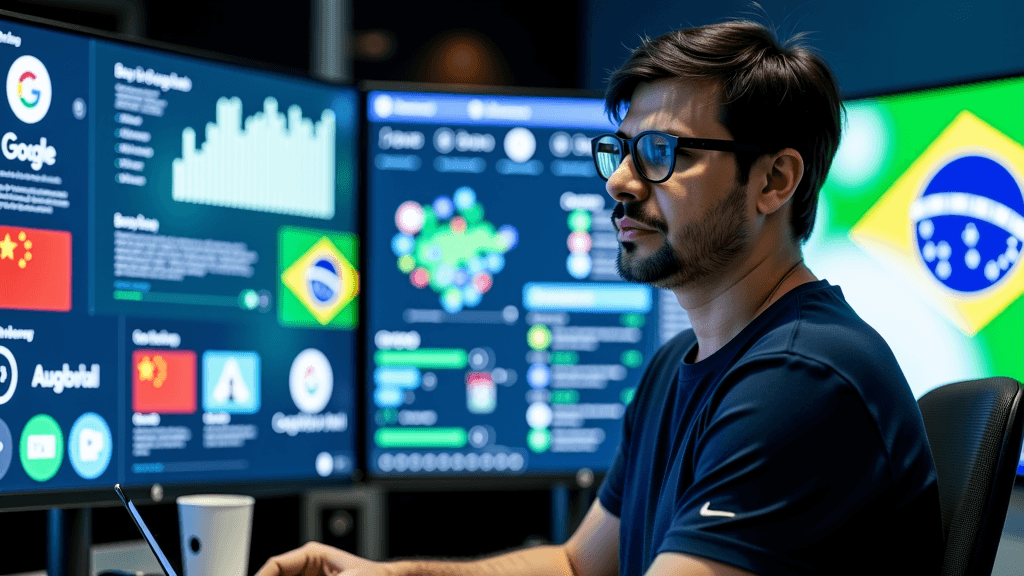Altimetrik Closes Mega-Acquisition in AI While Brazil Trains 100,000 Servers - Why This Convergence Marks the Adult Phase of Artificial Intelligence
October 26, 2025 | by Matos AI

While you were reading the headlines about yet another “AI revolution”, something much deeper was going on behind the scenes: artificial intelligence is finally moving from technological adolescence to business and government maturity.
In the last 24 hours, we have witnessed movements that define this transition in crystal clear terms. On the one hand, the Altimetrik closes acquisition of SLK Software, and creating a global powerhouse with more than 10,000 professionals specializing in AI in 17 countries. On the other, the Brazilian government has announced plans to train 100,000 civil servants in AI by 2026.
Coincidence? Absolutely not. We are witnessing the definitive consolidation of a market that has matured enough to sustain billionaire investments and structuring public policies simultaneously.
Join my WhatsApp groups! Daily updates with the most relevant news in the AI world and a vibrant community!
- AI for Business: focused on business and strategy.
- AI Builders: with a more technical and hands-on approach.
The Moment of Consolidation: When Bets Become Certainties
Altimetrik's acquisition of SLK is no longer one of those risky “bets” on AI that we saw a few years ago. According to Raj Sundaresan, Altimetrik's CEO, the union aims to “help companies grow responsibly in an AI-centric world, transforming the way they generate real and measurable impact with this technology.”
Notice the change in language? We're no longer talking about “transformative potential” or “promising future”. We're talking about measurable impact and responsible growth. That's maturity talking.
The new entity combines more than 150 corporate clients, including Fortune 500 leaders, and operates in more than 20 engineering centers globally. Most importantly, the stated focus is to “move companies from experimentation to continuous AI adoption and value creation”.
In my experience supporting thousands of startups and working with large corporations, I know exactly when a market stops being “emerging” and becomes “established”. And that's exactly what we're seeing.
Brazil at the Forefront: When the Public Sector Leads Transformation
While the private sector is consolidating globally, Brazil is doing something even more interesting: it is putting the public sector at the forefront of AI adoption. Rogério Mascarenhas, Secretary of Digital Government, couldn't be clearer: “Artificial intelligence is profoundly transforming the work of public servants in Brazil.”
The numbers are impressive:
- 100 thousand servers will be trained by 2026
- 117 projects in progress via the Artificial Intelligence Center
- R$ 100 million saved in 2025 with Alice software alone in government procurement
- LGPD-aligned ethical framework already in place
This is not experimentation. It's implementation on an industrial scale. And note the wisdom of the approach: rather than replacing jobs, the focus is on “transforming the way we work, requiring adaptation for ethical and productive use”.
In my career leading initiatives such as Start-Up Brasil and supporting public policies for innovation, I have rarely seen such a clear articulation between strategic vision and practical execution.
PGFN as a Case of Intelligent Implementation
A practical example of this maturity comes from Office of the Attorney General of the National Treasury (PGFN), which implemented generative AI to manage 2.3 million pending tax foreclosures through the Spoiler program.
The system doesn't replace prosecutors - it enhances them. AI analyzes processes, summarizes content and predicts steps, but the final decision remains human. It is the responsible application of technology that differentiates experimentation from real implementation.
The Authenticity Paradox: When AI Empowers the Human
One of the most fascinating insights of the last 24 hours came from photojournalist Lalo de Almeida, who said on the CasaFolha that “photojournalism gains strength with the wave of AI”.
Its logic is irrefutable: the more artificial images circulate, the greater the demand for authentic, certified photographs. AI isn't killing photojournalism - it's creating a premium market for authenticity.
At the same time, we see the Wikipedia losing 8% of human visitors while AI bots dramatically increase the consumption of their content. The irony is perfect: human content becomes even more valuable precisely when it is consumed primarily by machines.
Even Folha de S.Paulo is testing AI to moderate comments, not to eliminate human participation, but to make the environment healthier for qualified debates.
The New Economy of Autonomous Agents
Meanwhile, a parallel economy is quietly emerging. Autonomous AI agents already move US$ 13.5 billion and are expanding to a creator economy of US$ 250 billion.
These are no longer simple chatbots. We're talking about agents who:
- Generate savings of up to 35% in campaigns for major brands
- They operate independently in content creation and management
- Automate community management and data analysis
- Manage multiple sources of revenue, including NFTs and blockchain subscriptions
THE creation of the x402 protocol by Coinbase, with a market value already at US$ 178 million, demonstrates how large corporations are building the infrastructure for this M2M (machine-to-machine) economy.
Why This Moment Is Different
As someone who has been following innovation cycles for over 25 years, I can say this: this is the moment when AI stops being a promising technology and becomes an operational reality.
The signs are unmistakable:
1. Consolidation of the private market
Billion-dollar acquisitions like Altimetrik's indicate that the big players have identified where the real value lies and are investing heavily in consolidated capabilities, not speculative bets.
2. Structured Adoption in the Public Sector
Governments don't make long-term investments in experimental technologies. When you see a plan to train 100,000 servers, it's because the technology has already proven its operational viability.
3. Emergence of Specialized Markets
The creation of specific economies (such as crypto autonomous agents) shows that AI is no longer a generic solution, but is generating specific and measurable value niches.
4. Valuing Human Authenticity
Paradoxically, the proliferation of artificial content is increasing the value of authentic human labor - a clear sign of market maturity.
What this means for Brazilian companies
If you're still “experimenting” with AI, you're probably too late. The current moment calls for a more structured approach:
For corporate leaders: The question is no longer “should we use AI?”, but “how do we implement AI in a way that generates measurable and sustainable value?” The acquisition of Altimetrik shows that the market is rewarding consolidated expertise, not superficial experimentation.
For startups: The time is ripe for in-depth specialization in specific AI applications, not generic solutions. The market is mature enough to distinguish between “marketing AI” and “AI that generates real value”.
For governments and public bodies: Brazil is showing global leadership in the responsible implementation of AI in the public sector. There is a window of opportunity to position itself as a world reference in intelligent digital governance.
Three Practical Lessons for Your Organization
1. Focus on Implementation, Not Experimentation
As PGFN has demonstrated with its 2.3 million processes, mature AI solves real problems on a real scale. Identify a critical process in your organization and implement an AI solution that generates measurable results.
2. Develop Human Capacity in Parallel
Brazil's plan to train 100,000 civil servants is brilliant: there's no point in implementing AI without preparing people to work with it. Invest in both technology and training.
3. Build To Scale From The Start
Market consolidation means that small, fragmented solutions have less chance of survival. Think big from day one.
The Future Is Now (Literally)
We're no longer talking about the future of AI. We're talking about the present of mature AI. Organizations that understand this subtle but crucial difference will have a significant competitive advantage in the coming years.
The convergence we've seen in the last 24 hours - private consolidation, structured public adoption, the emergence of new markets and the valorization of the human element - officially marks the transition of AI from emerging technology to established infrastructure.
It's a historic moment, and anyone who doesn't position themselves properly now could miss the train for good.
In my mentoring work with executives and companies, I help leaders navigate exactly this transition: moving from superficial experimentation to strategic implementation of AI that generates real and sustainable value. Because the window to be a pioneer has already closed - but the window to be relevant is still open.
✨Did you like it? You can sign up to receive 10K Digital's newsletters in your email, curated by me, with the best content about AI and business.
➡️ Join the 10K Community here
RELATED POSTS
View all



